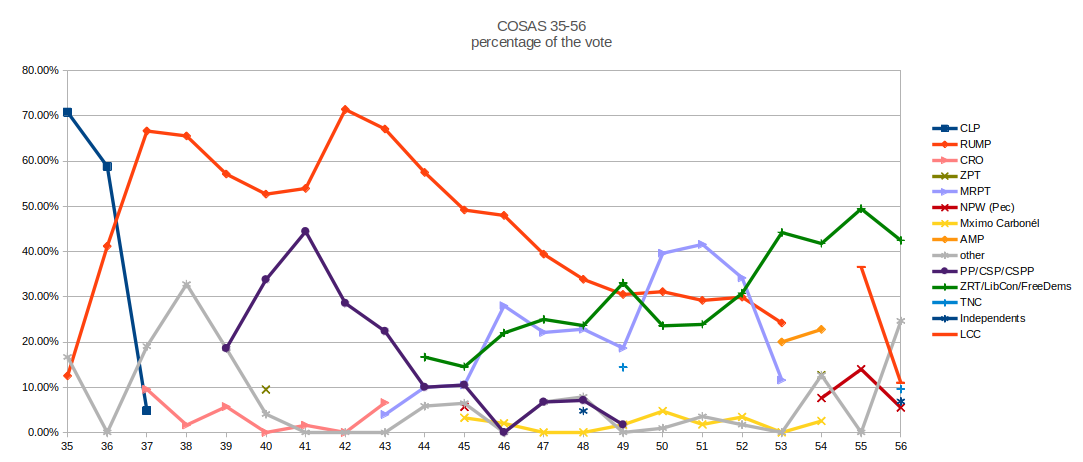General Election
Looking for the February 2023 General Election?
A general election is the method used in Talossa to select representatives for the Ziu and to vote on amendments to the Organic Law. A general election occurs each time that the Cosa is dissolved, either at the will of the Seneschal, following a government's failure to pass a vote of confidence or at the natural conclusion of its term of office.
History
The first general election was held in 1981, but its results were annulled after the outcome was rejected by King Robert I, whose Royal Socialist Party had lost out to Danihel Laurieir's Democratic Dandipratic Party. The first truly democratic election only took place in April 1985.
Composition
Each general election is generally composed of four parts.
Election to the Cosa
The election to the Cosa is the only part of the ballot that is guaranteed to be available to all Talossan voters. This part is always conducted by the Chancery, and parties who wish to contest it must submit at least a name, a leader, a 50-words statement and, since 2015, a list of candidates. They may optionally submit a link to their manifesto. To actually receive and hold seats, then, a registration fee of $10 (6¤40) must be paid to the Treasury.
Election to the Senate
The Senate is elected at staggered intervals of three provinces at a time, plus any special elections. Not all Senate elections are conducted by the Chancery, and provinces may decide to elect their own Senator however they wish; but elections conducted by the Chancery must by law use Instant Runoff Vote. Currently, running for the Senate and holding Senate seats is free of charge. Parties may endorse candidates, but since 2014 the Cosa and Senate elections are completely separate and to vote a "straight ticket" one must do so manually.
Referenda
General elections are also typically used to ratify referenda which have been passed by the Ziu during the last term. Voters have the option of voting in favour, against or to abstain on any of the proposals.
Election to the Provincial Assemblies
Certain provinces fill their provincial assembly by election. Those who do so may ask the Chancery to conduct the election, in which case it will appear on the national ballot. In any event, those elections are completely governed by provincial law.
Operation
General elections are generally conducted by the Chancery and scrutinised by an Electoral Commission composed by a Justice, a government appointee and a Senator chosen among those that are neither a political agent nor up for reelection.
General elections last a whole month. They generally begin on the 14th day, which is referred to as Balloting Day, and voting ends on the 1st of the following month, named Election Deadline. At this point, a partial, provisional tally of votes is made public.
Certification
The certification process then begins, whereupon the Chancery will proceed to work with the Electoral Commission in order to make the results official. Starting from the elections to the 51st Cosa, following reforms that were approved in a midterm referendum, the Commission only checks those ballots that are found to have potential irregularities by the Secretary of State.
For example, a voter might have cast a ballot on Wittenberg and then cast a second ballot on the database before the vote could be copied over by the Chancery; the only change that is allowed by the law would be the addition of a Senate vote, so should any other choice differ between the two ballots the Commission would order those votes to be reverted back. Other irregularities might include misspellings or votes being cast in unusual ways.
Some irregularities might include the voting process as a whole, such as votes being cast from suspicious IP addresses or large numbers of ballots being bounced by spam filters. The certification process does not usually include the provincial part of the ballot, unless that part was compiled irregularly (for example, the vote was cast twice with differences).
Certification ends on the 14th day of the month the voting ended (referred to as Certification Deadline), unless the Uppermost Court granted a stay following a complaint from the Electoral Commission. So far, this has never happened. It might happen that the three-member Commission does not vote to certify the election in time, such as when two members are unresponsive; in that case, the election is still considered to be certified.
By convention, an election is referred to by the month in which it ended. For example, the October 2005 General election took place from 15 September 2005 until 14 October 2005.
